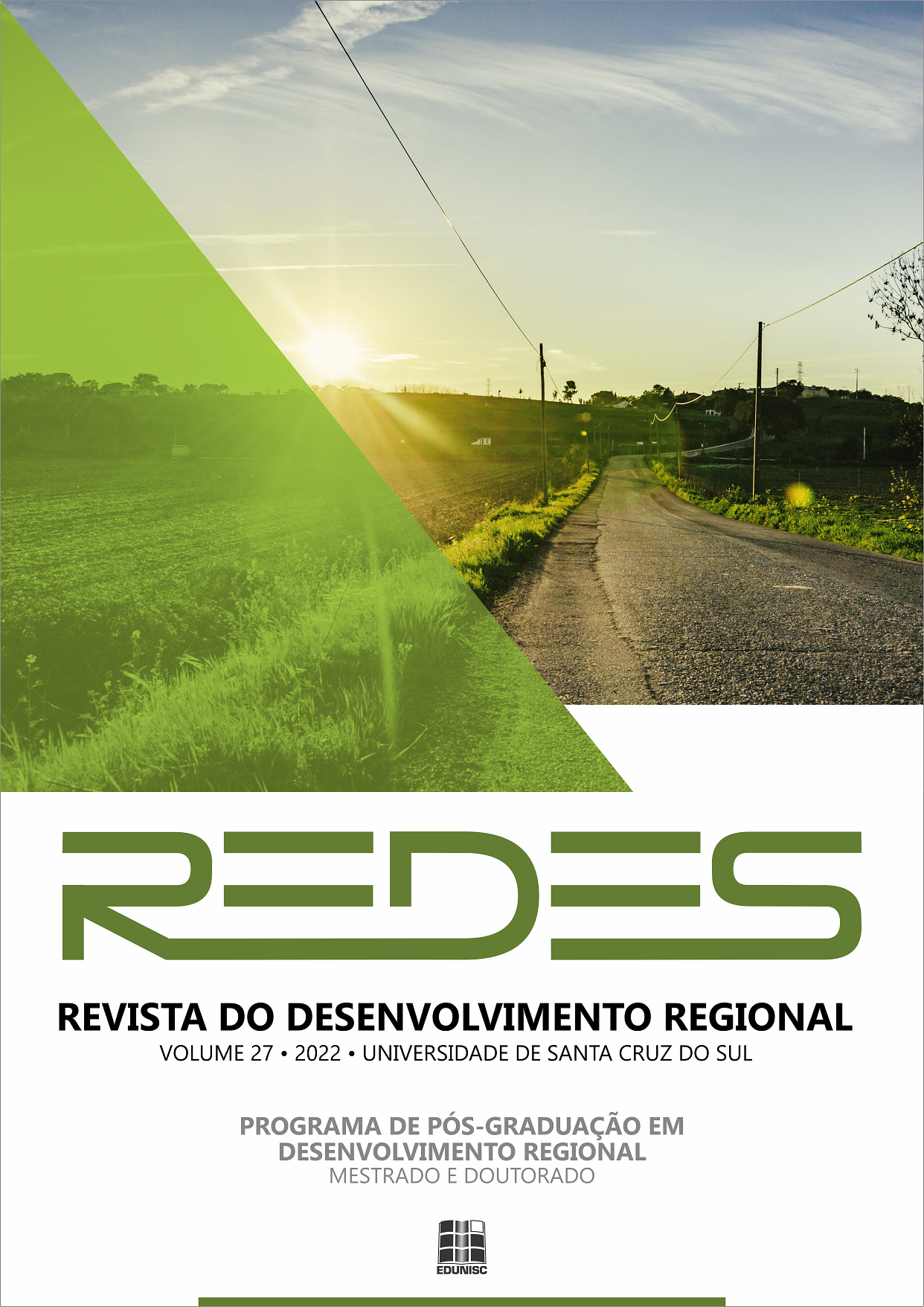Por Qué Dicen “Adiós”: Una Comprensión Crítica De La Economía Política De La Migración Contemporánea De Venezolanos
DOI:
https://doi.org/10.17058/redes.v27i1.17469Palabras clave:
Venezuela, Migración, Economía política, Teoría push and pull, Crisis económicaResumen
El objetivo de este estudio es crear un patrón al observar los antecedentes históricos del movimiento migratorio en Venezuela y revelar que la diáspora venezolana es un movimiento social que se lleva a cabo con factores de empuje, basados en la teoría de empujar y tirar. En este contexto, se ha centrado en los antecedentes económicos y políticos del movimiento migratorio venezolano y, al observar la historia de la economía política, se ha determinado que el movimiento migratorio se dio en tres oleadas diferentes. Mediante el análisis de los factores de empuje, se siguió el desarrollo del fenómeno migratorio en Venezuela y se trazó un marco con los contextos sociológicos de los países objetivo. El argumento principal del artículo es la afirmación de que el movimiento migratorio venezolano actual se dio con factores de empuje, considerando las condiciones económicas y políticas, mientras que las dos primeras olas migratorias dependieron de los factores de atracción.
Descargas
Citas
AKGEMCİ, E. MONROE Doktrini'nin İzinde: Latin Amerika'da ABD Müdahaleciliğinin Tarihsel Gelişimi. E. Akgemci, & K. Ateş, in Dünyanın Ters Köşesi (s. 53-74). İletişim Yayınları, 2020.
ALJAZEERA. Venezuela government denies facing migration crisis. 2020. Retrieved from https://www.aljazeera.com/news/2018/9/4/venezuela-government-denies-facing-migration-crisis
ALVARADO, S. E., & MASSEY, D. S. Continental Divides: International Migration in the Americas In Search of Peace: Structural Adjustment, Violence, and International Migration. Annals of the American Academy of Political and Social Science, Vol.630, 137-161, 2010.
BURGGRAAFF, W. J. The Venezuelan Armed Forces in politics, 1935-1959. University of Missouri Press, 1972.
CONNOLLY, A. Venezuela closing consulates in Vancouver, Toronto, Montreal amid diplomatic tensions. Global News, June 9, 2019. Retrieved from https://globalnews.ca/news/5371022/venezuela-closing-consulates-embassy-still-open/
FREİER, L. F., & PARENT, N. The Regional Response to the Venezuelan Exodus. Current History, 118 (805), 56-61, 2019.
GÜDER, S. A Comparative Analysis of the Foreign Policy Perspectives in two Latin American States: Brazil and Venezuela in the Twenty-First Century. Unpublished MA thesis, 2011.
GÜDER, S. Venezuela'da Maduro yeniden başkan, ABD tepkili. Anadolu Agency, 2018. Retrieved from https://www.aa.com.tr/tr/analiz-haber/venezuelada-maduro-yeniden-baskan-abd-tepkili/1153552
HELLINGER, D. Chávez and the Intellectuals. NACLA Report on the Americas, 45(4), 51-52.
HUANG, C., & GOUGH, K. The Venezuelan Migrant Crisis: Forging a Model for Regional Response. Center for Global Development, 2018. Retrieved from https://www.cgdev.org/publication/venezuelan-migrant-crisis-forging-model-regional-response
ISBELL, P. The New Energy Scenario and its Geopolitical Implications. Real Instituto Elcano, 2007.
JACOME, F. Petrocaribe: The Current Phase of Venezuela’s Oil Diplomacy in the Caribbean. Friedrich Ebert Stiftung Programa de Cooperación en Seguridad Regional, 2011.
KAYA, E. Hugo Chavez’in Petrol Politikası ve ABD. SDU Faculty of Arts and Sciences Journal of Social Sciences, Vol.31, 193-208, 2014.
KORNBLITH, M. Chavismo after Chávez? Journal of Democracy 24 (3), 47-61, 2014.
KÖSE, M. Türk Diasporasının Siyasal Katılımı Çerçevesinde Diaspora Politikalarının Gelişimi, (The development of diaspora policies through politicalparticipation of Turkish diaspora). Unpublished PhD thesis, 2020.
LUDLAM, S., & LIEVESLEY, G. Latin Amerika'da Radikal Sosyal Demokrasi Deneyimleri. Phoenix, 2012.
MORRISON, D. Hugo Chavez: The man who raised oil prices. Labour & Trade Union Review, 2000.
MUGGAH, R., & TOBÓN, K. A. Citizen Security in Latin America. Facts and Figures. Igarapé Institute, Strategic Paper, N. 33, 2018.
ÖBERG, S. Spatial and Economic Factors in Future South-North Migration. In: LUTZ İÇİNDE. W. The future population of the world : what can we assume today? (s. 336-358). Earthscan, 1996.
ÖZER, S. Latin Amerika'da Zorunlu Göç. C. U. Oğuz, S. Atvur, & R. İzol, in 21. Yüzyılda Latin Amerika (s. 273-292). Seçkin Yayıncılık, 2019.
REGİONAL REFUGEE INSTRUMENTS & RELATED. San José Declaration on Refugees and Displaced Persons, 1994. Retrieved from https://www.refworld.org/docid/4a54bc3fd.html
REGİONAL REFUGEE INSTRUMENTS & RELATED. Brazil Declaration and Plan of Action, 2014. Retrieved from https://www.refworld.org/docid/5487065b4.html
RESPONSE FOR VENEZUELANS. Coordination Platform for Refugees and Migrants from Venezuela, 2020.
RESPONSE FOR VENEZUELANS. Refugee and Migrant Response Plan. 2020.
Sullivan, M. P. Venezuela: Political Conditions and U.S. Policy. Congressional Research Service, 2009.
SYLVIA, R. D., & DANOPOULOS, C. The Chávez Phenomenon: Political Change in Venezuela. Third World Quarterly, Vol.24 No.1, 63-76, 2003.
TARVER, H., & FREDERICK, J. The History of Venezuela. New York: St. Martin's Press Griffin, 2006.
TONELLA-TÜZÜN, L. M. Latin Amerika ve Karayip Ülkelerinde Venezuelalı Mülteci Krizinin Yönetimi ve Covid-19 Pandemisi. In İ. Ermağan, E. Tahsin, & S. Tekin, Dünya Siyasetinde Latin Amerika, 3 (s. 475-498). Nobel Yayıncılık, 2021.
TOPAL, A. Latin Amerikayı Anlamak – Neoliberalizm, Direniş ve Sol. İstanbul: Yordam Yayınevi, 2007.
UNHCR. Convention and Protocol Relating to the Status of Refugees, 1951. UNHCR: https://www.unhcr.org/3b66c2aa10 adresinden alındı
UNHCR. Cartagena Declaration on Refugees. UNHCR. 1984. Retrieved from https://www.unhcr.org/about-us/background/45dc19084/cartagena-declaration-refugees-adopted-colloquium-international-protection.html
UNİTED NATİONS HİGH COMMİSSİONER FOR REFUGEES. The Guidance Note on the Outflow of Venezuelans. UNHCR. 2018.



